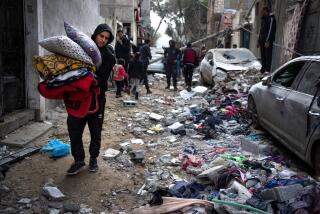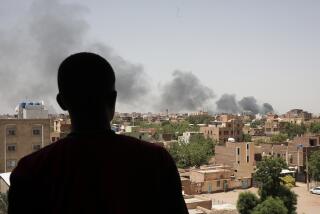Standing Up to the Warlords : U.S. public must understand the risk of casualties in Somalia
- Share via
The outlines of the military mission that the United States has volunteered to undertake in war-ravaged and famine-imperiled Somalia are now clearer, following initial U.N. Security Council consideration of plans for international intervention. Clearer, too, are the risks of that mission.
American forces, in division strength or greater, would not only take control of ports, airfields and roads so that food could be moved to those facing starvation. They would also act to disarm the bandit gangs that have been stealing most of the relief supplies sent into the country.
Disarming the bandits is absolutely necessary if there is to be any chance for order and stability to be imposed, something the United Nations is expected to try to achieve once the immediate famine crisis is dealt with. But requiring the gangs to give up their weapons carries measurable dangers. It’s unlikely that U.S. forces would encounter any organized resistance from the warlords controlling different parts of the country. It is probable they will run into scattered opposition. Casualties can be expected. That’s something Washington should bluntly acknowledge, before the first American sets foot on Somali soil.
Some Third World diplomats at the United Nations are expressing concern over the proposed U.S. military move into Somalia, not because of its humanitarian objectives but because they see it as constituting Western intervention in a developing country. That is an ideological taboo they are reluctant to see broken. In this case, though, they seem willing to accept it, given the alternatives: mounting a wholly Third World rescue operation--something they have shown no interest in doing--or letting hundreds of thousands more Somalis perish.
Still, they have a point. There is no reason that the task of getting food to the starving or disarming those who prey on them should be largely an American or Western responsibility. Somalia is an African and a Muslim country, a member of the Arab League and the Islamic League. There are plenty of non-Western states close by that are capable of helping out. Their cooperation in the coming rescue operation is a moral responsibility.
More to Read
Sign up for Essential California
The most important California stories and recommendations in your inbox every morning.
You may occasionally receive promotional content from the Los Angeles Times.













